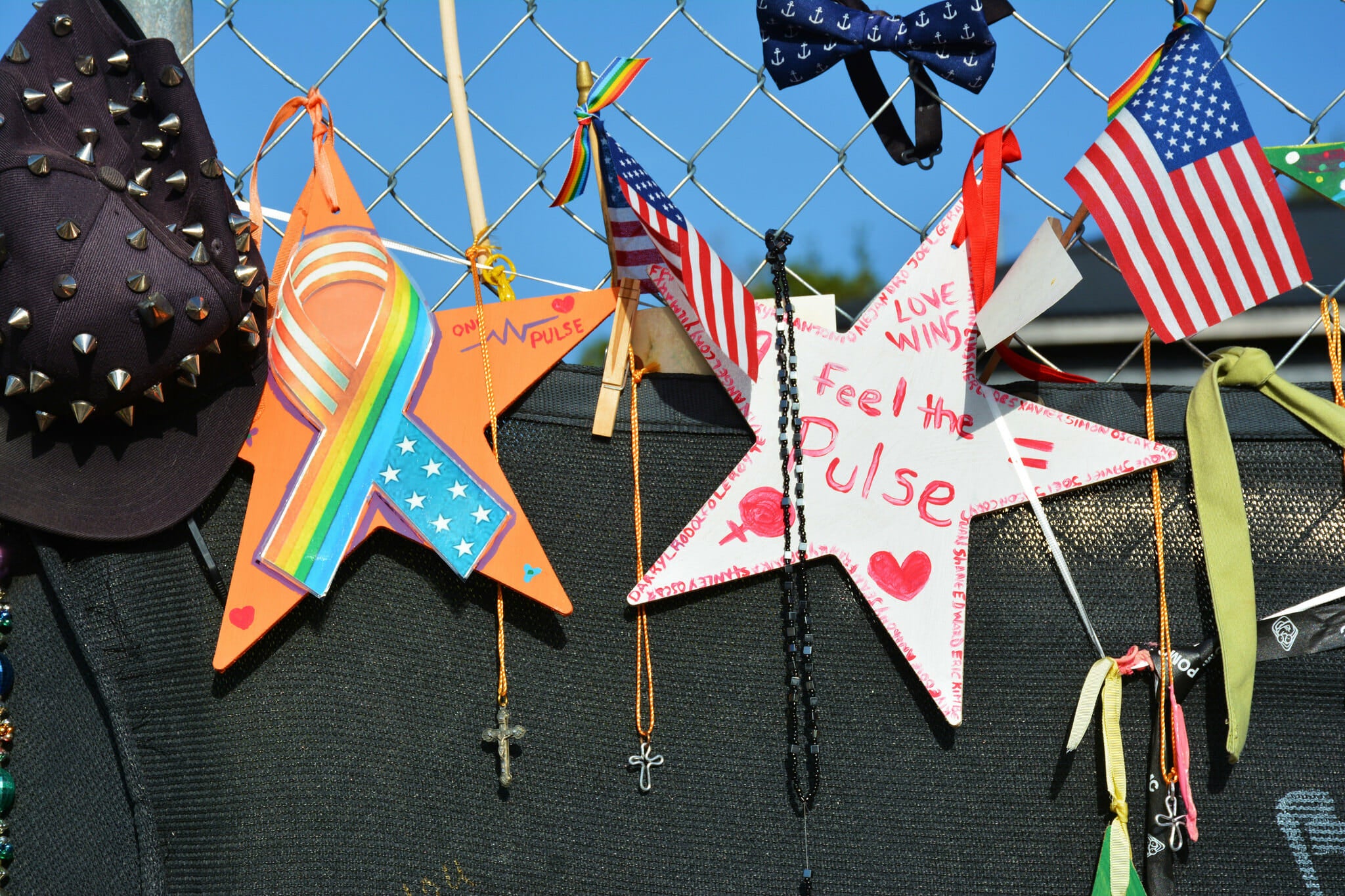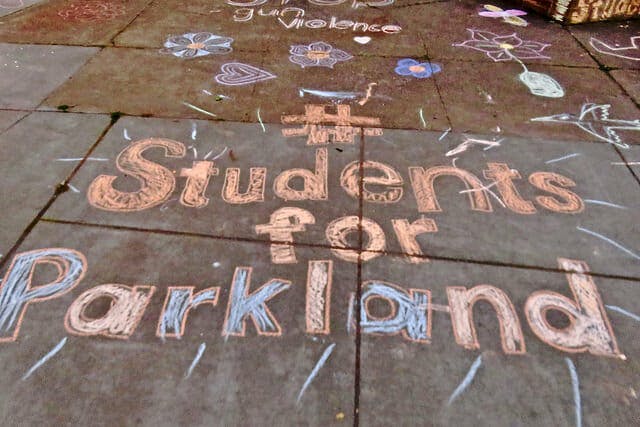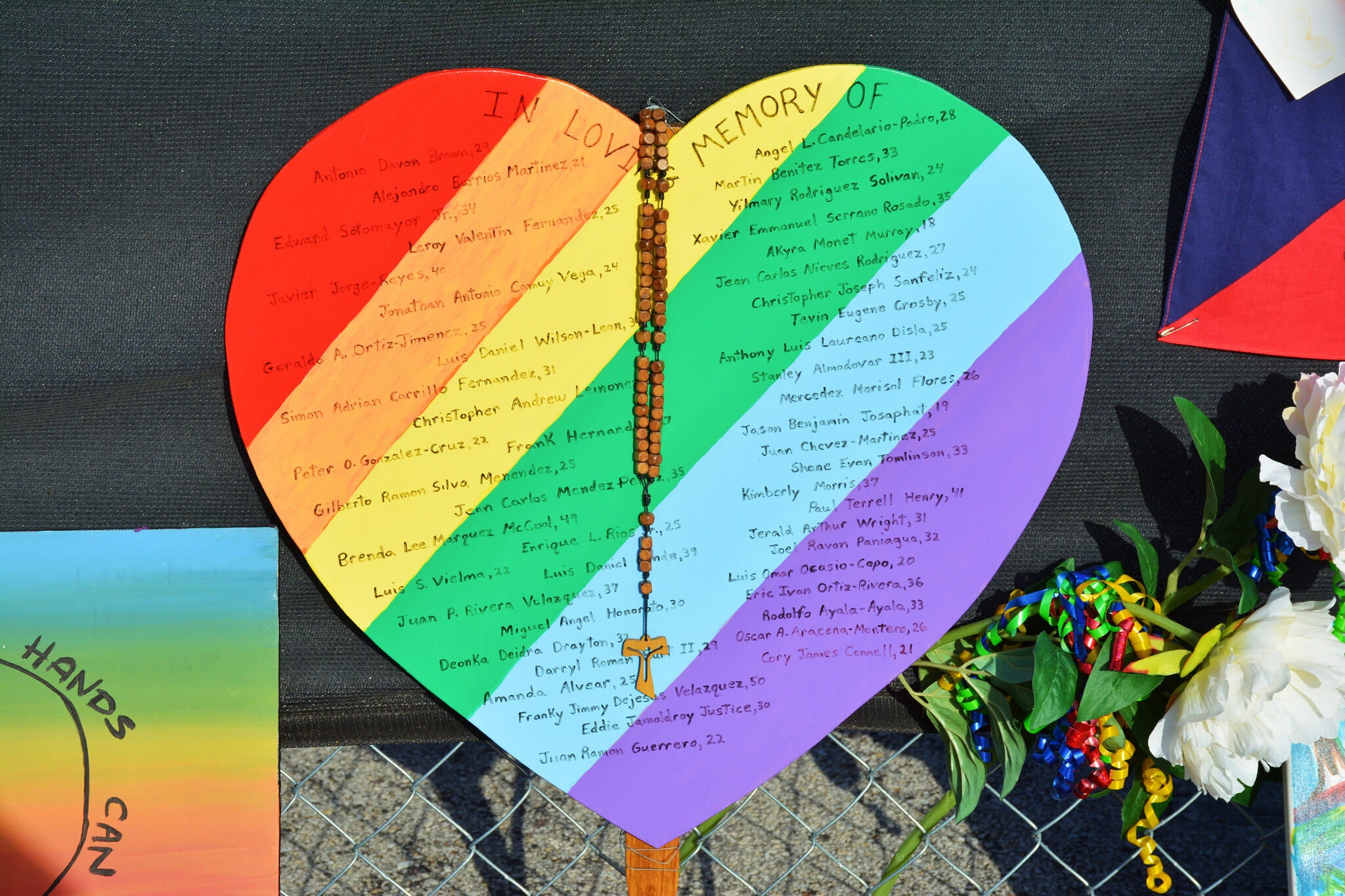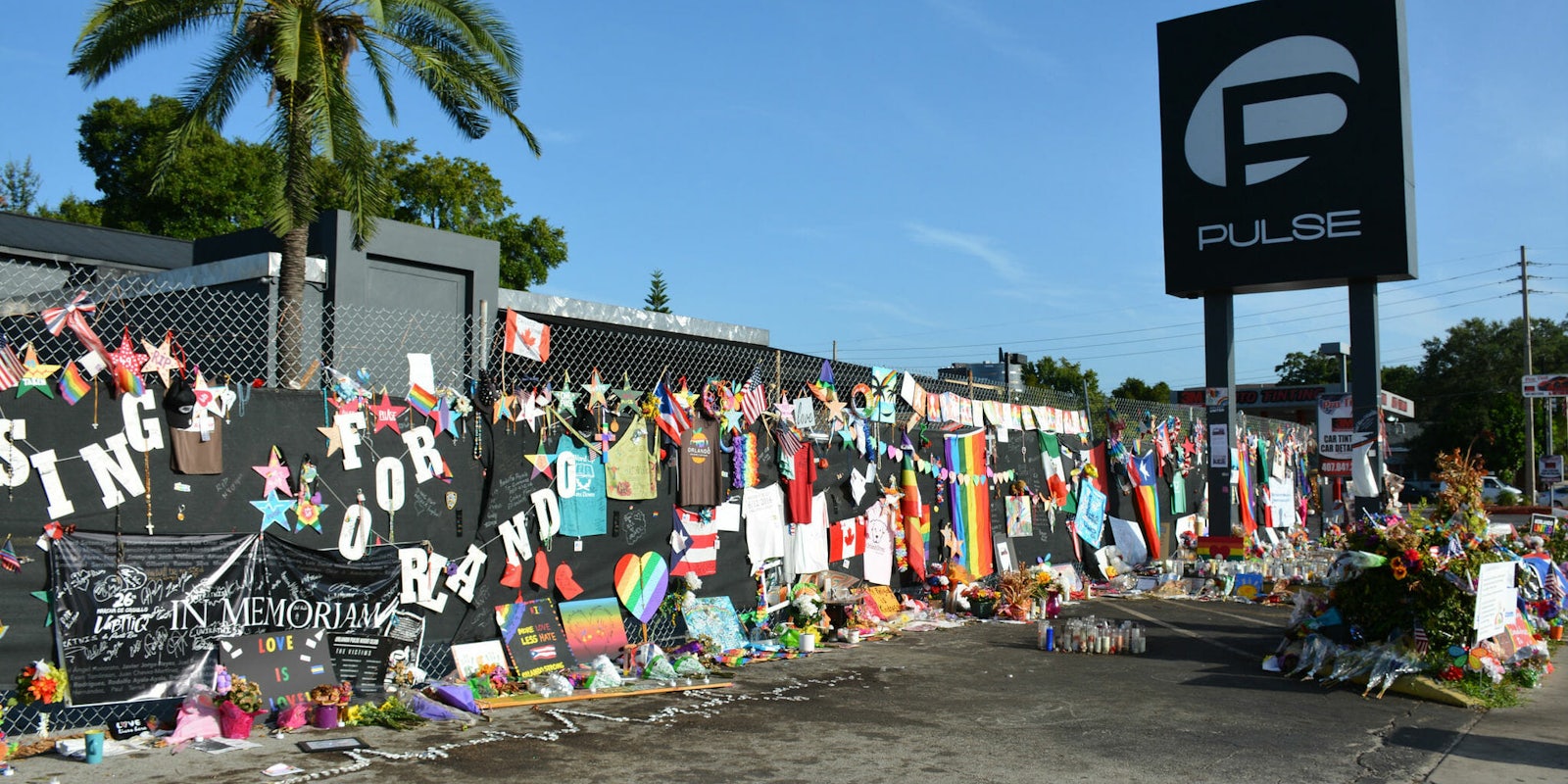It was a moment eerily familiar to survivors of the Pulse shooting: 17 students were killed and 14 more injured when a gunman opened fire on Marjory Stoneman Douglas High School in Parkland, Fla. on Feb. 14. The tragedy was Florida’s most violent mass shooting since the deaths of 49 people at the Orlando gay bar two years ago.
Many Pulse survivors have turned out to offer their support to Parkland students like Emma Gonzalez and David Hogg—who have become advocates for a national conversation on gun control in the nine days since the shooting.
Enakai Mpire, an employee of Pulse who was off the evening of the attack, spoke with students before a bus ride to the Florida capitol building where they planned to lobby state lawmakers to take long overdue action. Mpire told the young activists that survivors and families and loved ones of those gunned down in the 2016 shooting are with them.
“Your voices are heard,” he said on Tuesday. “That’s why we’re down here.”
Fellow survivor Brandon Wolf told a crowd gathered at a Never Again rally on Wednesday that it was time for politicians to take action against the epidemic of mass shootings which has become an all-too-normal feature of American life. He claimed that the National Rifle Association “has turned our country into a war zone.”
“Americans are done dying for you,” said Wolf, who lost two friends in the Pulse shooting, in an emotional address. “And our children are done being your sacrifices.”
The 29-year-old spoke to INTO on Thursday evening just hours before Gov. Rick Scott unveiled a proposal that would bar people under the age of 21 from purchasing assault weapons and ban “violent or mentally ill” people from buying guns.
As Wolf claims in a phone interview, he believes the Parkland students’ vocal, impassioned advocacy will spark the long overdue change America so desperately needs.
Nico Lang: How did you become involved after the shooting?
Brandon Wolf: There’s a natural process that happens when tragedies like these occur, people want to know how you’re feeling and they want to know your perspective. I was sitting at home on Monday evening. My friend sent me a message and asked me if I’d like to go to the vigil for the city of Tallahassee. I went over there and I said hello to everyone. I didn’t realize there would be Parkland students there. The students arrived to really thunderous applause and so much adoration for them. We got about halfway through the vigil and lit the candles.
It was then and there I realized that I actually hadn’t been to a candlelight vigil since the first one following Pulse. I was overcome with grief. It took me right back to that moment. I was thinking about my friends. I was thinking about that night. I was immediately in tears. I went to the back of the room and tried not to draw attention to myself—because it’s not about me. It’s really about these students.
When the program ended, one of the lawmakers found me and said, “I know you’re really upset, but I think the kids need to talk to you. Can you do that?” I said, “I don’t think they really need to talk to me.” He said, “Listen, you’re the only person in this room who understands what they’re going through. They need to hear from you that it’s going to be OK and that they’re strong enough to do this.”

I went to these students and to my surprise and delight, they circled me and put their arms around me. They gave me the world’s biggest hug. It was the most comforting thing I’ve felt in the last couple years. I almost felt like the friends I lost at Pulse were with them. It was an immediate bond. I understand what they’re going through. I understand what they’re going to go through. We’re almost like family. We didn’t mean to be, but we are like family.
You said the reason that the lawmaker advocated you speak to them was that they felt you would be able to share with them your perspective on what it was like to be a survivor of such a horrific national tragedy. What did you tell them?
I told them a couple of things. First and foremost, I am so proud of every single one of them. They cannot possibly imagine the amount of bravery, strength, and courage it takes to do what they’re doing. I told them I am so honored to know them.
Second of all, I told them, “Don’t do anything that doesn’t make sense to you.” I’ll give you an example. We were going to the rally yesterday at the capitol. There was one student who wasn’t sure if he wanted to speak. He had said a couple times that it was going to be a game-time decision, but the adults in the room seemed like they were pressuring him. They wanted to know, “Are you going to be on the program? Are you not going to be on the program?” These are the organizers of a rally and they’re trying to get all this stuff done—and you can feel his anxiety. This kid is 15 or 16 years old, and he doesn’t know if he’s too nervous to speak.
I pulled him off to the side and I said, “You know what? It’s up to you. I’ll tell you right now: If you speak, you’re going to be amazing. And if you choose not to speak, it wasn’t the right time. But either way, you do what you want.”
He did. He eventually spoke and he was fantastic, of course. The obligation that I feel—and maybe it comes from a sense of wishing I had done something differently at Pulse—is to protect and defend these kids from what I know is going to be a cruel and cold world outside.
When it came to the Pulse shooting, you said that you wish you could have done things differently. Can you talk about what you mean by that?
They call it survivor’s guilt. There is a natural tendency to ask what you could have done differently. There’s only one other person—really—who has asked me that when we’re talking in this setting. He asked me, “Do you feel guilty for what happened at Pulse?”
I think that was the first time I had ever grappled with that question myself. It was there in the back of my mind. I don’t know if I’d ever been honest with myself about what I felt. The reason my friends were there at Pulse that night was because of me. I begged them to come out. I told them I needed their support. I was going through a breakup and super obsessed with the person. They didn’t want to go out. They weren’t interested in going out that night, but they came out because they loved me and supported me. I don’t know if I’ll ever forgive myself for that.
But what I think is beautiful and important is that I’m going to make it up to them by ensuring that these kids get justice and the next generation of kids don’t even have to think about mass shootings as a possibility in their school. The generation of parents shouldn’t have to worry about dropping their kids off.

I think that will do them justice, and that’s what will make me feel absolved. That’s what makes me filled the most with joy: the potential to turn something really bad into change for real good.
Have you given yourself the space to forgive yourself for that guilt that you feel?
I’m working on it. I don’t think that’s an overnight process. I’ve come a long way since Pulse, but I’m working on it. I work on it every day.
Would you be able to tell me about your experience that night at Pulse?
Pulse was a safe space. I had grown so accustomed to spending my free time at Pulse. I don’t think I could have ever imagined it was possible. We went out that night. It was a Saturday night. My ex texted me out of nowhere and asked me if I wanted to go out. Like anybody who is infatuated with their ex, I said, “Sure, why not?” I immediately sent a message to my best friends Drew [Leinonen] and Juan [Guerrero] and asked for their support. They resisted a little bit but, eventually, I coerced them into going with me. We met up, we got to Pulse around midnight. It was very, very busy. I remember that. I remember that distinctly because everyone in the group was mad at me that we ended up at Pulse. But there we were. It was Latin night. There was some awkward tension between my ex and I.
Drew, my very best friend in the world, took us out to the patio and he pulled us into two different corners. He and Juan each took a person and talked to us about what love actually means. They talked to us about letting go of the small things. They talked about not letting our insecurities stand in the way. At the end of the conversation, Drew brought us together, huddled us into a little circle, and put his arms around us, and he said, “You know what we never say enough in the world? That we love each other. So I want to tell you guys that I love you very much.”
I didn’t know that would be the last conversation I had with him, but it was.
It was about an hour later. We were finishing up for the night. My ex and I went to the bathroom and we were in the stall when the first shots rang out. I remember a dozen people coming into the bathroom and there was panic and fear. You could see it in their faces. They had seen death. They had seen the ultimate hell. We waited there as the first shots died off. We asked ourselves, “Should we go? Should we stay? What should we do?” We crouched there on the floor until the second round of shooting started, and then we decided to make a run for it. We ran out of the side door. I just remember making it not even half a block and I crumpled on the sidewalk. My ex said, “We gotta go, we gotta go!”
I looked up at him and all I could say to him was, “They are still in there.” That moment will stick with me for the rest of my life. I started calling and calling and texting, but I knew at that point, it was already too late.
What kind of advocacy have you been doing since the Pulse shooting in June 2016?
A lot. I’ve gotten these opportunities to speak in a variety of arenas to different audiences. It always comes back to this theme: I was really complacent before Pulse. I was the armchair quarterback. I was the one who would play drinking games during the Republican debates but wasn’t sure who I would vote for in a primary. Pulse changed all of that. I instantly became ultra-involved. I joined the Board of Directors for a political action committee based in Washington, D.C. I was a surrogate for multiple Democratic candidates that cycle. It was a presidential election year. I worked with Hillary Clinton’s campaign. That was heartbreaking.
What I’m most proud of, though, is that a couple friends of mine and I launched The Drew Project. It’s a nonprofit organization we built in honor of our best friend that we lost that night. We established Gay-Straight Alliance programs in public schools. We gave away college scholarships—called the Spirit of Drew awards. We also have a GSA grant program where we give money to existing GSAs currently here in the state of Florida.

I’m really proud of those things. But I don’t think I’ve ever felt so fired up as I have since spending time with these Parkland students.
You mentioned before when we were texting about this story that it inspires you to see young people leading a national movement on gun control. What inspires you about seeing young people on the front lines of the issue?
The thing I stressed about most in high school was where I was going to eat lunch. That was all I really worried about, and I thought I was ultra-involved back then. But then I see these kids and their relentless optimism, their boundless hope, and their vision that the world can be better than it is today, and I’m inspired. The people who are going to save us are the next generation. This current crop of legislators and lawmakers we have are totally spineless and useless, in my opinion. It’s tough to negotiate with them because they don’t have an interest in getting anything done. They’re so busy padding their 401k accounts that they really don’t care about making change that’s important to people like you and me.
These kids actually do. They can’t be called biased. They can’t be called partisan. They’re just teenagers that are really pissed off that someone put them in a bad place and got their friends killed. I think it’s powerful. I think it’s unstoppable, quite honestly.
What has it been like to see continued complacency from lawmakers, especially from Florida legislators, after yet another shooting in the state?
It’s not surprising. For everybody out there, I’m not sure if they’re aware, but the Florida legislature is about as backward as it gets. It doesn’t surprise me one ounce that this is what we saw in response. When put to a vote whether they’d like to hear a debate on banning assault weapons—not on whether they’d like to ban them but whether they’d like to have a conversation about it—it does not shock me that with Marjory Stoneman Douglas students in the gallery—they still said no. They made a political calculation. They decided the same playbook is going to work every single time. If they just drown us out or sprinkle some bread crumbs along the way, they will satisfy our appetites for long enough that the news will turn the channel.
What they underestimated is that these kids are not going to give up. There are a lot of pissed off parents and pissed off people who are tired of being their sacrifices. We get it—you’ve got to run a campaign and you’ve got to get reelected. But the fact that you’ve chosen your campaign’s bank account so many times over the constituents you serve was eventually going to come back and bite you in the ass.
I’m just so thankful that it’s children who are coming up to do it for us.
At the rally, you challenged politicians to “fix their nightmare or write your concession speeches.” What did it mean for you to challenge that complacency among politicians in Florida so directly?
I wouldn’t call it a challenge. I would call it a promise. I promise you that because this crop of students, people in my generation will not take this anymore. We’re not OK with the status quo. We’re not OK with being told it’s not the right time to talk about it. We’re talking about it right now. My promise to these legislators is that if they cannot figure out something to do and they cannot fix this issue, there is a whole host of people waiting in the wings to do the job for them. I get it. I run businesses. I understand how this world works. If someone who works for me can’t get the job done, we have a really honest conversation: “This is not personal, I don’t blame you. But potentially this is not the right fit for you.”
We have those conversations all the time. I think it’s high time that constituents had those same conversations with their lawmakers: “Love you to death, but you have totally failed at this job.” It’s high time to hire somebody who can do it right.
What gives you hope that things will change this time around? It always seems like after every mass shooting, there’s this moment where it feels like there’s momentum and there’s optimism. After Sandy Hook, it felt like things were changing, but then that hope was ripped out from under people like a rug. What makes this time different?
Young people, to put it simply. There was a moment at the rally that was really meaningful to me. One of the representatives said, “Statistically speaking, people under 35 don’t vote.” We know that. It’s just a fact. He followed that by asking, “How many people in this crowd are under 35 years old?” There were nearly 10,000 people in this crowd. I can confidently say from my spot on the stage that it was at least 85 percent of that crowd. When he asked them, “How many of you are aware of the midterms and are going to vote in them?” Those same people raised their hands. They had angry faces on. They had signs challenging legislators to stop taking NRA money.
These are really angry young people. I cannot imagine a better force for change in the world than the same force that has changed the world so many times before: young people, students, and people who have to actually live in the future they’re building today.
This story originally appeared on INTO and has been republished with permission.


